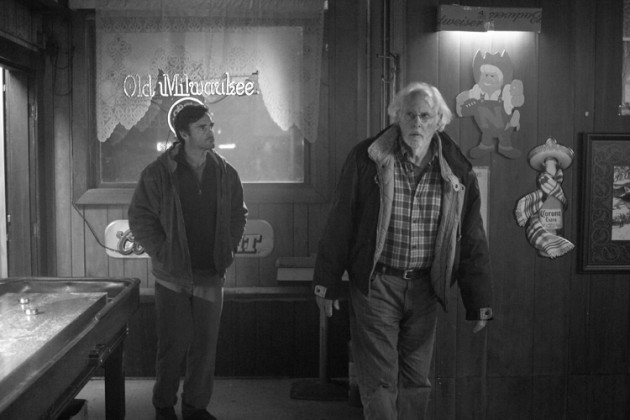
The Wolf of Wall Street
Non ammettere il valore altrui per non porsi l’altro come limite, non lasciarsi offuscare da precetti morali o solidaristici: uno smarcamento sadiano – senza giungere all’intenzionale negazione fisica, come avviene invece nell’opera del noto Marchese – da quel ciclo generato dal rispetto dell’uomo per l’uomo, che sottrae i momenti sovrani, il piacere correlato a essi e, di conseguenza, che priva della considerazione massima verso sé stessi. Pulsa tale volontà di potenza in The Wolf of Wall Street di Martin Scorsese, lungometraggio tratto dall’omonima autobiografia di Jordan Belfort, nel quale si assiste all’ascesa e alla caduta di quest’Eliogabalo newyorkese o, come dichiara Leonardo DiCaprio (che qui lo impersona), un Caligola moderno trasposto in una società di broker. (…)
Nebraska
Nebraska di Alexander Payne è un’opera marcatamente diacronica, un film che si inspessisce di senso nei lunghi respiri, nei cigolii dei silenzi, srotolandosi lentamente con un bianco e nero moderno che riporta immediatamente all’Ingmar Bergman di Smultronstället (Il posto delle fragole); già, perché il viaggio dell’anziano protagonista, Woody (Bruce Dern), è anche un’escursione nella memoria, sua e dei personaggi che gli si accostano lungo i milleduecento chilometri verso Lincoln, in Nebraska appunto, dove un fantomatico milione di dollari attende di essere ritirato. La memoria di Woody, nonostante l’uomo barcolli al primo stadio di Alzheimer, ricorda alcuni dettagli del passato e contribuisce a una ricomposizione di fatti remoti; un ripristino, attuato attraverso faticosi spostamenti da un luogo all’altro, che coinvolge più soggetti, moglie, parenti e vecchi conoscenti, e che, al figlio David (Will Forte), restituisce gli anziani genitori in una prospettiva più ampia. (…)

The Wolf of Wall Street
Rejecting the value of others so that it can’t become a limit, not allowing oneself to be clouded by concepts of morality or integrity: a Sadian dissociation from that cycle that is generated by the respect from one man to another, which takes away the supreme moments, the pleasure connected to the latter and, consequently, that denies the full consideration of oneself. These views are the pulse of The Wolf of Wall Street, Scorsese’s latest film inspired by Jordan Belfort’s homonymous autobiography, which tells of the rise and fall of an American Heliogabalus or, as Leonardo DiCaprio (who plays Belfort) suggests, a modern Caligula in a society of brokers. (…)
Nebraska
Nebraska, by Alexander Payne, is a markedly diachronic work; a film that garners meaning during the long sighs or in the creaking silences, slowly unrolling a modern monochromatic sequence that is reminiscent of Smultronstället’s (Wild Strawberries) Ingmar Bergman. This is because the journey of the elderly protagonist, Woody (Bruce Dern), is also a voyage through his memory and that of the characters that accompany him during the 1,200 kilometres he travels to arrive in Lincoln, Nebraska, where an elusive one million dollars is waiting for him. Woody’s memory, despite his symptoms of early Alzheimer’s, remembers some past details that together contribute to the reconstruction of past episodes. A recovery, carried out through strenuous travels, involving various people, his wife, relatives and old acquaintances, and which makes David (his son, played by Will Forte) rediscover his elderly parents in a new light. (…)
Giordano Bernacchini
D’ARS year 54/nr 217/spring 2014 (abstract dell’articolo)
Acquista l’intero numero in formato epub/mobi oppure abbonati a D’ARS





